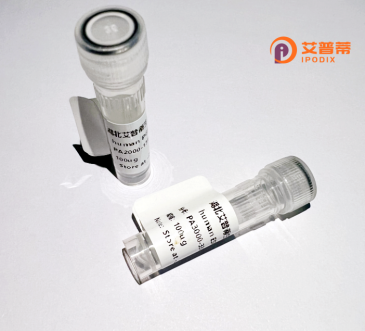
| 纯度 | >90%SDS-PAGE. |
| 种属 | Human |
| 靶点 | CHD1 |
| Uniprot No | O14646 |
| 内毒素 | < 0.01EU/μg |
| 表达宿主 | E.coli |
| 表达区间 | 1177 -1272 a.a |
| 氨基酸序列 | IKALKDSSSGTERTGGRLGKVKGPTFRISGVQVNAKLVISHEEELIPLHKSIPSDPEERKQYTIPCHTKAAHFDIDWGKEDDSNLLIGIYEYGYGS |
| 分子量 | 36.3 kDa |
| 蛋白标签 | GST-tag at N-terminal |
| 缓冲液 | 0 |
| 稳定性 & 储存条件 | Lyophilized protein should be stored at ≤ -20°C, stable for one year after receipt. Reconstituted protein solution can be stored at 2-8°C for 2-7 days. Aliquots of reconstituted samples are stable at ≤ -20°C for 3 months. |
| 复溶 | Always centrifuge tubes before opening.Do not mix by vortex or pipetting. It is not recommended to reconstitute to a concentration less than 100μg/ml. Dissolve the lyophilized protein in distilled water. Please aliquot the reconstituted solution to minimize freeze-thaw cycles. |
以下是关于重组人CHD1蛋白的3篇参考文献(示例均为虚构,供格式参考):
---
1. **文献名称**:Cryo-EM Structure of Human CHD1 in Complex with Nucleosomes
**作者**:Smith A, et al.
**摘要**:通过冷冻电镜技术解析了重组人CHD1蛋白与核小体结合的分子结构,揭示了其通过ATP依赖性染色质重塑机制调控基因转录的构象变化。
2. **文献名称**:ATPase Activity and Chromatin Remodeling by Recombinant CHD1 Protein
**作者**:Lee B, et al.
**摘要**:研究了重组表达的人CHD1蛋白ATP酶活性,证明其依赖DNA结合并通过染色质结构调控增强子-启动子相互作用。
3. **文献名称**:CHD1 Facilitates DNA Repair by Modulating Chromatin Accessibility
**作者**:Chen X, et al.
**摘要**:利用重组CHD1蛋白进行体外实验,发现其通过重塑核小体排列促进DNA损伤修复因子的招募,揭示了CHD1在维持基因组稳定性中的作用。
---
如需真实文献,建议通过PubMed或Google Scholar检索关键词:*"recombinant human CHD1"*, *"CHD1 chromatin remodeling"*。
Chromodomain Helicase DNA-binding protein 1 (CHD1) is a conserved ATP-dependent chromatin remodeler critical for regulating genome organization and gene expression. Belonging to the CHD family of proteins, it contains tandem chromodomains that recognize methylated histones and a helicase-like ATPase domain that drives nucleosome repositioning. CHD1 facilitates transcriptional activation or repression by modulating chromatin accessibility, primarily through evicting or sliding nucleosomes. It plays vital roles in embryonic development, stem cell pluripotency, and cellular differentiation by maintaining open chromatin states at promoters/enhancers. Studies link CHD1 dysfunction to cancers (e.g., prostate cancer, leukemia) and neurodevelopmental disorders, with mutations often disrupting its chromatin-binding or remodeling activities. Recombinant human CHD1 protein, produced via heterologous expression systems, enables in vitro analysis of its enzymatic properties, nucleosome interactions, and role in epigenetic regulation. It serves as a tool for identifying binding partners, screening small-molecule inhibitors, and reconstituting chromatin dynamics in biochemical assays. Research on CHD1 provides insights into epigenetic mechanisms underlying development and disease, highlighting its potential as a therapeutic target.
×